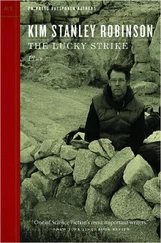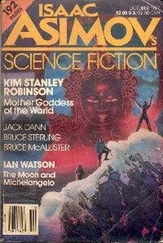They sit in the cockpit and look up at the sail, or ahead at the ice. The iceboat’s navigation steers them away from the rottenest patches, spotted from satellites, and so the automatic pilot changes their course frequently, and they shift around the cockpit when necessary. Floury patches slow them the most, and over those the boat sometimes decelerates pretty quickly, throwing the unprepared forward into the shoulder of the person sitting next to them. Eileen is banged into by Hans and Frances more than once; like her they have never been on iceboats before, and their eyes are round at the speeds it achieves during strong gusts over smooth ice. Hans speculates that the sandy patches mark old pressure ridges, which stood like long stegosaur backs until the winds ablated them entirely away, leaving their load of sand and silt behind on the flattened ice. Roger nods. In truth the whole ocean surface is blowing away on the wind, with whatever sticks up going the fastest; and the ocean is now frozen to the bottom, so that no new pressure ridges are being raised. Soon the whole ocean will be as flat as a tabletop.
This first day out is clear, the royal blue sky crinkling in a gusty west wind. Under the clear dome of the cockpit it’s warm, their air at a slightly higher pressure than outside. Sea level is now around three hundred millibars, and lowering year by year, as for a great storm that never quite comes. They skate at speed around the majestic promontory of the Phlegra Peninsula, its great prow topped by a white-pillared Doric temple. Staring up at it Eileen listens to Hans and Frances discuss the odd phenomenon of the Phlegra Montes, seaming the north coast of Elysium like a long ship capsized on the land; unusually straight for a Martian mountain range, as are the Erebus Montes to the west. As if they were not, like all the rest of the mountain ranges on Mars, the remnants of crater rims. Hans argues for their being two concentric rings of a really big impact basin, almost the size of the Big Hit itself but older than the Big Hit, and so mostly obliterated by the later impact, with only Isidis Bay and much of the Utopian and Elysian Seas left to indicate where the basin had been. “Then the ranges could have been somewhat straightened out in the deformation of the Elysium bulge.”
Frances shakes her head, as always. Never once has Eileen seen the two of them agree. In this case Frances thinks the ranges may be even older than Hans does, remnants of early-tectonic or prototectonic plate movement. There’s a wide body of evidence for this early-tectonic era, she claims, but Hans is shaking his head: “The andesite indicating tectonic action is younger than that. The Phlegras are early Noachian. A pre—Big Hit big hit.”
Whatever the explanation, there the fine prow of rock stands, the end of a steep peninsula extending straight north into the ice for four hundred kilometers out of Firewater. A long sea cliff falling into the sea, and the same on the other side. The pilgrimage out the spine to the temple is one of the most famous walks on Mars; Eileen has made it a number of times since Roger first took her on it about forty years ago, sometimes with him, sometimes without. When they first came they looked out on a blue sea purled with whitecaps. Seldom since has it been free of ice.
He too is looking at the point, with an expression that makes Eileen think he might be remembering that time as well. Certainly he would remember if asked; his incredible memory has still not yet begun to weaken, and with the suite of memory drugs now available, drugs which have helped Eileen to remember quite a bit, it might well be that he will never forget anything his whole life long. Eileen envies that, though she knows he is ambivalent about it. But by now it is one of the things about him that she loves. He remembers everything and yet he has remained stalwart, even chipper, through all the years of the crash. A rock for her to lean on, in her own cycles of despair and mourning. Of course as a red it could be argued he has no reason to mourn. But that wouldn’t be true. His attitude was more complex than that, Eileen has seen it; so complex that she does not fully understand it. Some aspect of his strong memory, taking the long view; a determination to make it well; rueful joy in the enduring land; some mix of all these things. She watches him as he stares absorbed at the promontory where he and she once stood together over a living world.
How much he has meant to her through the years has become beyond her ability to express. Sometimes it fills her to overflowing. That they have known each other all their lives; that they have helped each other through hard times; that he got her out into the land in the first place, starting her on the trajectory of her whole life; all these would have made him a crucial figure to her. But everyone has many such figures. And over the years their divergent interests kept splitting them up; they could have lost touch entirely. But at one point Roger came to visit her in Burroughs, and she and her partner of that time had been growing distant for many years, and Roger said, I love you, Eileen. I love you. Remember what it was like on Olympus Mons, when we climbed it? Well now I think the whole world is like that. The escarpment goes on forever. We just keep climbing it until eventually we fall off. And I want to climb it with you. We keep getting together and then going our ways, and it’s too chancy, we might not cross paths again. Something might happen. I want more than that. I love you.
And so eventually they set up rooms in her co-op in Burroughs. She continued to work in the Ministry of the Environment, and he continued to guide treks in the backcountry, then to sail on the north sea; but he always came back from his treks and his cruises, and she always came back from her working tours and her vacations away; and they lived together in their rooms when they were both at home, and became a real couple. And through the years without summer, then the little ice age and the crash itself, his steadfast presence has been all that has kept her from despair. She shudders to think what it would have been like to get through those years alone. To work so hard, and then to fail . . . it’s been hard. She has seen that he has worried about her. This trip is an expression of that: Look, he said once after she came home in tears over reports of the tropical and temperate extinctions—look, I think you need to get out there and see it. See the world the way it is now, see the ice. It’s not so bad. There have been ice ages before. It’s not so bad.
And as she had been more and more holing up in Burroughs, unable to face it, she finally was forced to agree that in theory it would be a good thing. Very soon after that he organized this trip. Now she sees that he gathered some of their friends from the Olympus Mons expedition to help entice her to come, perhaps; also, once here, to remind her of that time in their lives. Anyway it’s nice to see their faces, flushed and grinning as they fly along.
Skate east! the wind says, and they skitter round Scrabster, the northeastern point of Elysium, then head south over the great plate of white ice inserted into the incurve of the coast. This is the Bay of Arcadia, and the steep rise of land backing the bluffs is called Acadia, for its supposed resemblance to Nova Scotia and the coast of Maine. Dark rock, battered by the dark north sea; sea cliffs of bashed granite, sluiced by big breakers. Now, however, all still and white, with the ice that has powdered down out of the spray and spume flocking and frosting the beach and the cliffs until they look like wedding-cake ramparts. No sign of life in Acadia; no greens anywhere in sight. This is not her Elysium.
Roger takes over the sailing from Arthur, and brings them around a point, and there suddenly is a steepwalled square island ahead, vivid green on top—ah. A township, frozen here near the entrance to a fjord, no doubt in a deep channel. All the townships have become islands in the ice. The greenery on top is protected by a tent which Eileen cannot see in the bright sun. “I’m just dropping by to pick up the rest of our crew,” Roger explains. “A couple of young friends of mine are going to join us.”
Читать дальше
Конец ознакомительного отрывка
Купить книгу












